
Bartholomew's Cobble is a 329-acre (1.33 km2) National Natural Landmark, open space preserve, agricultural preserve, and bio-reserve located in southwest Massachusetts in the village of Ashley Falls abutting Canaan, Connecticut. The preserve contains more than 800 plant species, including North America's greatest diversity of ferns and the greatest overall biodiversity in Berkshire County, Massachusetts; it also contains Massachusetts' highest populations of ground nesting bobolinks. It was declared a National Natural Landmark in October 1971.

The Daniel Webster Wildlife Sanctuary is a sanctuary owned by the Massachusetts Audubon Society, the largest conservation organization in New England, in the town of Marshfield, Massachusetts. The sanctuary, formerly the farm of Edward Dwyer, statesman Daniel Webster and the William Thomas family of Marshfield, the first English landowner to live on the sanctuary land, was purchased by Mass Audubon in 1984 thanks to the volunteer efforts of the Committee for the Preservation of Dwyer Farm for the People of Marshfield. The sanctuary contains 507 acres (2.1 km2) of mixed cultural grasslands, red maple swamps, a five-tiered wet panne, Webster Pond and a section of the Green Harbor River. It is the site of the annual Daniel Webster Farm Day celebration. Surrounding lands owned by the town of Marshfield and the Marshfield Airport increase the local open space area to more than 1000 acres (4 km2).

The North River Wildlife Sanctuary is a wildlife sanctuary, owned by the Massachusetts Audubon Society, located on the North River in the town of Marshfield, Massachusetts. The sanctuary contains 184 acres (0.74 km2) of mixed cultural grasslands, red maple swamps, oak-pine woodland, and access to the river. The North River Wildlife Sanctuary came to Mass Audubon as a gift of the Killam and Rodgers families in 1977.

The Massachusetts Audubon Society, commonly known as Mass Audubon, founded in 1896 by Harriet Hemenway and Minna B. Hall and headquartered in Lincoln, Massachusetts, is a nonprofit organization dedicated to "protecting the nature of Massachusetts". Mass Audubon is independent of the National Audubon Society (NAS), and was founded earlier than the NAS. Mass Audubon protects more than 40,000 acres of land throughout Massachusetts, saving birds and other wildlife, and making nature accessible to all with its wildlife sanctuaries and 20 nature centers.

The Ipswich River Wildlife Sanctuary, which is one of the Massachusetts Audubon Society’s largest wildlife sanctuaries, is located in Topsfield and Wenham, Massachusetts. Much of its 1,955-acre (7.91 km2) landscape was created by a glacier 15,000 years ago.
North Hill Marsh Pond is a 38-acre (150,000 m2) pond in Duxbury, Massachusetts, USA. The pond is the headwaters to the Back River. The pond is located northeast of Round Pond and north of Island Creek Pond. A wildlife sanctuary borders this pond to the south, and the North Hill Country Club, accessible via Merry Avenue, off Route 14, borders this pond to the northeast. The water quality is impaired due to non-native aquatic plants in the pond.

Massaemett Mountain is a mountain in Shelburne, Franklin County, Massachusetts, USA. It is named for a chief of the Pocumtuck tribe, a confederacy of Native Americans who inhabited the region. Part of the Berkshire Mountains, Massaemett lies just east of the village of Shelburne Falls, 7 miles (11 km) west of the county seat of Greenfield, Massachusetts, and 87 miles (140 km) west of Boston. The summit features a historic stone fire tower constructed in 1909. The top cab is not open to the public, however the stairway is kept open and offers views from multiple windows facing the four directions of the compass. From the tower, views include the Berkshires and Taconic Mountains to the west, the Green Mountains of Vermont to the north, Mount Wachusett to the east, and the Holyoke Range to the south.
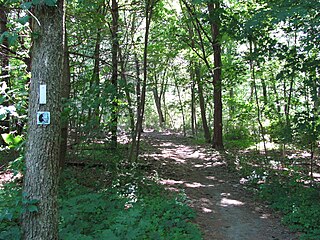
The Bay Circuit Trail and Greenway or Bay Circuit is a Massachusetts rail trail and greenway connecting the outlying suburbs of Boston from Plum Island in Newburyport to Kingston Bay in Duxbury, a distance of 200 miles (320 km).
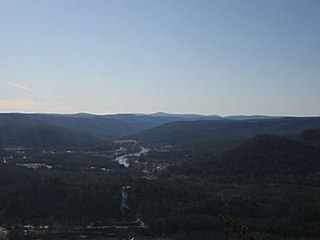
High Ledges is a wildlife sanctuary located in Shelburne, Massachusetts. The 587-acre (2.38 km2) property, located on the northern portion of Massaemett Mountain, is owned by Massachusetts Audubon Society.

Moose Hill Farm is a 347-acre (140 ha) open space preserve and historic farm complex located in Sharon, Massachusetts near the 450 feet (140 m) summit of Moose Hill. The property, acquired in 2005 by the land conservation non-profit organization The Trustees of Reservations, includes farmland, woodlots, 21 farm buildings, hiking trails, stands of mature American Chestnuts, and scenic vistas of the Boston skyline. Moose Hill Farm is part of a larger area of protected open space including state land and the Massachusetts Audubon Society's Moose Hill Wildlife Sanctuary.
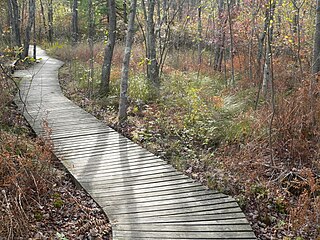
Moose Hill Wildlife Sanctuary is a 1,971 acres (798 ha) wildlife sanctuary located in Sharon, Massachusetts. The property is the oldest property of the Massachusetts Audubon Society, established in 1916. It is adjacent to Moose Hill Farm, which is owned by the Trustees of Reservations.

The Connecticut Audubon Society, founded in 1898 and headquartered in Fairfield, Connecticut, is a nonprofit organization dedicated to "conserving Connecticut’s environment through science-based education and advocacy focused on the state’s bird populations and habitats." Connecticut Audubon Society is independent of the National Audubon Society (NAS), just as in the neighboring state of Massachusetts, where Massachusetts Audubon Society is independent of the NAS.
The Margery Adams Wildlife Sanctuary, usually called the Adams Wildlife Sanctuary, is a 40-acre (0.16 km2) headquarters building and land parcel owned and managed by the Illinois Audubon Society. Its second-growth forest land and restored tallgrass prairie are managed so as to maximize the diversity of the urban wildlife that visits the property. It is named after Margery Adams who donated the property to the society.

Willard Pond is a small, protected lake in Antrim, New Hampshire, United States. The lake, located in southwestern New Hampshire, is about 108 acres (44 ha) in size with an average depth of 25 feet (7.6 m) and a maximum depth of 58 feet (18 m). No petroleum motors are allowed, and fly fishing is the only form of fishing allowed. It is part of the dePierrefeu Wildlife Sanctuary, which is owned by the New Hampshire Audubon Society. Because the pond and the land around it are part of the sanctuary, the shore is unable to be developed. Therefore, there are no buildings around the pond and there won't be any in the foreseeable future. Willard is instead surrounded by extensive amounts of wilderness and hiking trails that lead around the pond and to the summits of Bald Mountain and Goodhue Hill. Willard is a popular fishing, boating and hiking destination, and it has become more popular with its mention in numerous magazines and newspapers.
The Illinois Audubon Society is a nonprofit organization based in Springfield, Illinois. Its mission statement states that the Society intends to "promote the perpetuation and appreciation of native plants and animals and the habitats that support them."
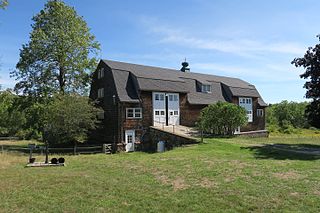
Wachusett Meadow Wildlife Sanctuary is a 1,135 acres (459 ha) wildlife sanctuary located in Princeton, Massachusetts, owned by the Massachusetts Audubon Society. Charles T. Crocker III donated 600 acres of land along with several buildings to Mass Audubon in 1956. The former farmstead includes a nature center, 12 miles of trails through woodlands, wetlands, and meadows, and a large pond with canoe rentals in season.
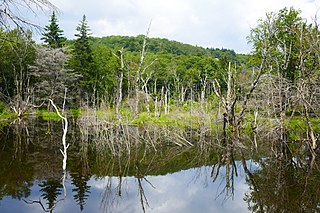
Pleasant Valley Wildlife Sanctuary is a 1,405 acres (569 ha) wildlife sanctuary located in Lenox, Massachusetts owned by the Massachusetts Audubon Society. There are 7 miles of trails and a large pond on Yokun Brook. The Overbrook Trail leads to the summit of Lenox Mountain.

Stony Brook Wildlife Sanctuary is a wildlife sanctuary in Norfolk, Massachusetts. The 107-acre sanctuary, owned by the Massachusetts Audubon Society, is adjacent to the 140-acre Bristol Blake State Reservation. The two areas are "cooperatively managed" by Mass Audubon and the Department of Conservation and Recreation (DCR).

Drumlin Farm is a 291 acre farm and wildlife sanctuary which is also the site of the headquarters of the Massachusetts Audubon Society. It is located at 208 South Great Road in Lincoln, Massachusetts.

Wellfleet Bay Wildlife Sanctuary is a 1,183 acres (479 ha) wildlife sanctuary located in Wellfleet, Massachusetts, on Cape Cod. The sanctuary was established by the Massachusetts Audubon Society in 1957. It includes walking trails along Wellfleet Harbor of Cape Cod Bay as well as a nature center and a campground.



















